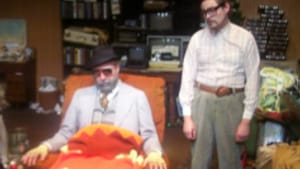Stay in the Loop
BSR publishes on a weekly schedule, with an email newsletter every Wednesday and Thursday morning. There’s no paywall, and subscribing is always free.
Beckett's vision, expanded
Beckett's "Endgame' by EgoPo (3rd review)

Samuel Beckett's Endgame is a misery of a comedy: a post-apocalyptic tragicomedy of emptiness. "Bare interior," it begins, "Gray light." Purists find it inappropriate to set the play in a 1970s basement suite teeming with the clutter of a diminished American packrat family— the dirty decadence of old TV sets and plastic Christmas trees seems the opposite of Beckett's spare intentions.
Robert Zaller, in a previous review , expressed disapproval of EgoPo's idiosyncratic South Jersey interpretation. He'd prefer a bare apartment, as most other productions choose: "None of this," Zaller says of director Lane Savadove's idea of Hamm's back story, "has the slightest warrant in the text." Beckett's intentions were European, Zaller claims, and therefore the play shouldn't be about South Jersey.
Is Euripides relevant only to Greece because he wrote for Greeks?
"Beckett exercised fanatical control over the precisely stipulated details of all his plays," Zaller notes, "and permitted no deviation from them during his lifetime." So did Eugene O'Neill, as well as his estate (managed by his wife) after he died. This doesn't mean that the man didn't go on a bit, and couldn't do with some cutting.
Faded plastic and vinyl
Audiences have come to expect a complete and thoroughly conceptualized production from EgoPo, and this is what Endgame gives us. This Endgame is foremost a personal play of family relationships gone to rot but still clinging; Beckett's post-nuclear war concept is marginalized. Those not immediately repulsed by this idea will find that it's realized in this production without the company stretching Beckett's characters or words.
"When I think of what desolation is to Americans," Savadove writes in the program notes, "I think of faded plastic and vinyl, I think of years of pointless hoarding, I think of family cruelty being uncovered for all to see." The strength of Dan Soule's design is its cloying claustrophobia and, as Savadove says, its presence "in the dark collective unconscious of all Americans." For a set that's almost unchanged from start to finish, this "South Jersey basement" is highly active because of its unsettling effect on the eye and its overcrowding of Clov's paths, forcing him along the same ritualistic routes, now visibly worn into the rug.
Hidden too long from public view
The actors translate Beckett's family of repugnant isolation and cruelty with complex but easily recognizable characterizations. Doug Greene's Clov, in mis-fitting pants and unstylish cop moustache, slumped shoulders and childish mannerisms, mirrors Hamm's room: Both have been hidden from public view for so many years that those in charge have long since ceased to care.
Ed Swidey brings the domineering and self-indulgent Hamm to life with obsessive neuroses, posturing genteelly with foppish hand gestures, starting and stuttering and restarting lines in a compulsive attempt to find brilliant theatrical grace for the "story" he must tell. To combat this selfish abandon, Greene's Clov is servant but not servile, hilariously antic in his digs and insults even as he proclaims that he never disobeys an order.
Fear of aging
Nagg and Nell, Hamm's parents, played by J. Center and Ann Gundersheimer, are tender with a vulnerability dramatized by Center's uncontrollable tremors and Gundersheimer's wide, lost eyes. But dressed in wedding garments instead of the traditional nightcaps, they're as grim as they are wistful, obsessing over a past that seems disturbingly like the present of Hamm and Clov. They bicker in a manner similar to their younger counterparts, and Nell even says, "I'll leave you," Clov's frequent tease.
Nagg's bellowing (which has developed more of the terror slightly perceptible in Hamm) and his story (made embarrassingly racist in this production) remind us precisely why Beckett's characters (like the rest of us) are afraid of growing old.
These creatures are hilarious, but the joke is as grisly as a safe falling out of a window. "Nothing is funnier than unhappiness," says Nell, and we laugh wickedly at their expense.
Sex as foreplay to death
EgoPo's Endgame is a teasing, anticlimactic foreplay to death. With his repeated, "I'll leave you," Clov invokes a fantasy of escape that titillates both characters' desires and fears. When Clov says, "I see my light dying," a fascinated grin spreads across his face; and when Nagg says, "By rights we should have been drowned," he is wistful, regretting his continued life. Whenever death is mentioned, the speaker could very easily be talking about sex.
Clov, at times pitifully, unconsciously childlike, returns at the end of the play in traveling clothes and carrying his Snoopy suitcase (more morose, faded Americana!) to provide audience to Hamm's final, drawn-out speech: the end of his story that he has been avoiding.
What keeps them alive
But like the haunting recollections of a sad, unbalanced uncle, these characters won't end themselves. Hamm will start another story and Clov will be there to hear it. Hope may be found in this cheesy, rotting family, and the game is what keeps them alive— the end game that doesn't end.
In Savadove's production, Beckett's characters to speak to us personally. The inhabitants of Soule's set could be the sole survivors of Beckett's nuclear holocaust, but they could also be those odd next-door neighbors whom no one ever sees. They could be a universal tale of existential suffering or they could be Jersey Devils, myths from marginalized suburban America: the family members whose phone calls we screen.♦
To read another review by Steve Cohen, click here.
To read another review by Robert Zaller, click here.
Robert Zaller, in a previous review , expressed disapproval of EgoPo's idiosyncratic South Jersey interpretation. He'd prefer a bare apartment, as most other productions choose: "None of this," Zaller says of director Lane Savadove's idea of Hamm's back story, "has the slightest warrant in the text." Beckett's intentions were European, Zaller claims, and therefore the play shouldn't be about South Jersey.
Is Euripides relevant only to Greece because he wrote for Greeks?
"Beckett exercised fanatical control over the precisely stipulated details of all his plays," Zaller notes, "and permitted no deviation from them during his lifetime." So did Eugene O'Neill, as well as his estate (managed by his wife) after he died. This doesn't mean that the man didn't go on a bit, and couldn't do with some cutting.
Faded plastic and vinyl
Audiences have come to expect a complete and thoroughly conceptualized production from EgoPo, and this is what Endgame gives us. This Endgame is foremost a personal play of family relationships gone to rot but still clinging; Beckett's post-nuclear war concept is marginalized. Those not immediately repulsed by this idea will find that it's realized in this production without the company stretching Beckett's characters or words.
"When I think of what desolation is to Americans," Savadove writes in the program notes, "I think of faded plastic and vinyl, I think of years of pointless hoarding, I think of family cruelty being uncovered for all to see." The strength of Dan Soule's design is its cloying claustrophobia and, as Savadove says, its presence "in the dark collective unconscious of all Americans." For a set that's almost unchanged from start to finish, this "South Jersey basement" is highly active because of its unsettling effect on the eye and its overcrowding of Clov's paths, forcing him along the same ritualistic routes, now visibly worn into the rug.
Hidden too long from public view
The actors translate Beckett's family of repugnant isolation and cruelty with complex but easily recognizable characterizations. Doug Greene's Clov, in mis-fitting pants and unstylish cop moustache, slumped shoulders and childish mannerisms, mirrors Hamm's room: Both have been hidden from public view for so many years that those in charge have long since ceased to care.
Ed Swidey brings the domineering and self-indulgent Hamm to life with obsessive neuroses, posturing genteelly with foppish hand gestures, starting and stuttering and restarting lines in a compulsive attempt to find brilliant theatrical grace for the "story" he must tell. To combat this selfish abandon, Greene's Clov is servant but not servile, hilariously antic in his digs and insults even as he proclaims that he never disobeys an order.
Fear of aging
Nagg and Nell, Hamm's parents, played by J. Center and Ann Gundersheimer, are tender with a vulnerability dramatized by Center's uncontrollable tremors and Gundersheimer's wide, lost eyes. But dressed in wedding garments instead of the traditional nightcaps, they're as grim as they are wistful, obsessing over a past that seems disturbingly like the present of Hamm and Clov. They bicker in a manner similar to their younger counterparts, and Nell even says, "I'll leave you," Clov's frequent tease.
Nagg's bellowing (which has developed more of the terror slightly perceptible in Hamm) and his story (made embarrassingly racist in this production) remind us precisely why Beckett's characters (like the rest of us) are afraid of growing old.
These creatures are hilarious, but the joke is as grisly as a safe falling out of a window. "Nothing is funnier than unhappiness," says Nell, and we laugh wickedly at their expense.
Sex as foreplay to death
EgoPo's Endgame is a teasing, anticlimactic foreplay to death. With his repeated, "I'll leave you," Clov invokes a fantasy of escape that titillates both characters' desires and fears. When Clov says, "I see my light dying," a fascinated grin spreads across his face; and when Nagg says, "By rights we should have been drowned," he is wistful, regretting his continued life. Whenever death is mentioned, the speaker could very easily be talking about sex.
Clov, at times pitifully, unconsciously childlike, returns at the end of the play in traveling clothes and carrying his Snoopy suitcase (more morose, faded Americana!) to provide audience to Hamm's final, drawn-out speech: the end of his story that he has been avoiding.
What keeps them alive
But like the haunting recollections of a sad, unbalanced uncle, these characters won't end themselves. Hamm will start another story and Clov will be there to hear it. Hope may be found in this cheesy, rotting family, and the game is what keeps them alive— the end game that doesn't end.
In Savadove's production, Beckett's characters to speak to us personally. The inhabitants of Soule's set could be the sole survivors of Beckett's nuclear holocaust, but they could also be those odd next-door neighbors whom no one ever sees. They could be a universal tale of existential suffering or they could be Jersey Devils, myths from marginalized suburban America: the family members whose phone calls we screen.♦
To read another review by Steve Cohen, click here.
To read another review by Robert Zaller, click here.
What, When, Where
Endgame. By Samuel Beckett; directed by Lane Savadove. EgoPo Productions presentation through November 15, 2009 at St. Stephen’s Theater, 923 Ludlow St. (215) 552-8773 or www.egopo.org.
Sign up for our newsletter
All of the week's new articles, all in one place. Sign up for the free weekly BSR newsletters, and don't miss a conversation.

 Julius Ferraro
Julius Ferraro